Qawwali: More Familiar Than You Think
Photo: Asif Ali Khan Qawwali Music of Pakistan ensemble. They perform in Ann Arbor on March 21st, 2014. Photo by Cynthia Sciberras.
Qawwali is a kind of Sufi devotional music that is popular in South Asia, especially in parts of Pakistan and India. It has existed for at least 700 years. Although it is often referred to as a meditative and trance-inducing music, qawwali can be equally fast-paced and rapturous. The main themes of qawwali are love, devotion and longing for the Divine.
Listeners acquainted with North Indian classical music or the Whirling Dervishes of Turkey may hear something familiar. Although there are obvious differences, in many ways qawwali is comparable to North Indian classical music, Hindustani raga. India and Pakistan, as well as many other areas in South Asia share similar aspects of music due to shared history and similar instruments such as the harmonium and tabla. In both Hindustani classical music and qawwali, group performances are the norm; however, in qawwali, there is often a lead singer and a chorus that claps with the percussion during the pieces. In both kinds of music, one will usually hear each song progress through a slow introductory alap followed by a quicker development. Another similarity is the extensive vocal improvisation featured in both.
Concert duration will be another familiar feature where listeners can compare Hindustani classical music and qawwali music. Especially in contrast to music in the Western world, the length of time spent on each piece, as well as the concert’s total length will normally continue much longer than the duration expectations for usual concerts heard in the United States. Part of the reason for this length is that there are many different kinds of pieces that traditionally make up qawwali. Another reason is that the words are repeated with variations in order to bring out deeper meanings, as well as to lead the listener and performer into a trance, hal, which would then lead to spiritual enlightenment, fana.
Below are 5 different kinds of qawwali songs that you might hear with examples you might listen to.
1. A hamd is a song praising Allah. Traditionally, this is a piece used to begin a qawwali performance. An example is “Be Parwah de Naal Newn laa lia,” sung by Nusrat Fateh Ali Khan.
2. A naat is a song praising the Prophet Muhammad, which usually follows the opening hamd. Asif Ali Khan can be heard here singing “Madine ke Waali Madine Bulalo.”
3. The next song to be sung would be a manqabat, which either praises Imam Ali or one of the Sufi saints. For an example, listen to Rafiq Dildar sing “Ali Ali Maula.”
4. A genre of song sung less often is the marsiya which is a lamentation over the death Imam Husayn’s family during the Battle of Karbala. Below, you can listen to an example, “Hussain Hai,” sung by Nusrat Fateh Ali Khan.
5. One last major type of qawwali should be mentioned. A ghazal is a love song, and while the poetry’s meaning is spiritual, the lyrics often sound quite secular to an outsider. Many ghazals speak of the suffering of being separated from the one you love. Here is a recording of Abida Parveen, a female Pakistani vocalist, singing “Yaar Ko Hamne Ja Ba Ja Dekha.” It is important to note that in general, women do not sing qawwali, and even when the songs are sung, women sing in a different style than the men, as can be heard in this recording.
After listening to some of these pieces, it is impossible not to appreciate the entrancing quality of this music with its winding melodies and expansive qualities. Come listen to more on Friday, March 21st at 8 pm at Rackham Auditorium! The Asif Ali Khan Qawwali Music of Pakistan ensemble will be performing more beautiful, rousing music. While you’re there, see if you can pick out what kind of song is being sung!
Sources:
- Abbas, S. B. (2007). Risky knowledge in risky times: Political discourses of qawwali and sufiana-kalam in Pakistan-Indian Sufism.The Muslim World, 97(4), 626-639.
- Farida, Syeda. (2012). Whirling Dervishes, soulful qawwali. The Hindu.
- Huda, Q. (2007). Memory, performance, and poetic peacemaking in qawwali. The Muslim World, 97(4), 678-700.
- Kugle, S. (2007). Qawwali between written poem and sung lyric, or… how a ghazal lives. The Muslim World, 97(4), 571-610.
- Tanzeel, u. R. (2013, Sep 03). Qawwali: Sufi devotional music. The Financial Daily.
- Qureshi, R. B. (1981). Qawwali: Sound, context and meaning in Indo-Muslim Sufi music. (Order No. 8217377, University of Alberta (Canada)). ProQuest Dissertations and Theses, 513-513 p.



